CITB accelerates apprenticeship grants, and prioritises Apprenticeship support and direct employer funding within its Skills Stability Plan, despite reduced income

@CITBuk announces new measures to reduce costs
CITB has announced a range of measures to make savings and reduce operating costs as it adjusts to the new post-Covid financial landscape.
The measures are part of the organisation’s ongoing Coronavirus response, and follows the decision in June to cut Levy bills by 25% across the next two years – an income reduction of £166m.
Despite this reduced income, CITB has accelerated apprenticeship grants, and prioritised Apprenticeship support and direct employer funding within its Skills Stability Plan.
Due to this reduced income, CITB is unable to apply the previously planned pay increase this year and has confirmed that no performance bonus payments will be made in 2021 as it takes action to reduce expenditure and protect the industry’s Levy funds. Other cost-cutting measures have included the Executive team taking voluntary 20% pay cuts, other colleagues also volunteering pay cuts or reduced hours, over half of colleagues having been furloughed and making full use of all reserves.
In addition, CITB has set out a proposal to alter its longstanding redundancy policy, which is no longer appropriate. The proposal was discussed today by CITB with unions and staff representatives, with a decision to follow the completion of consultations.
CITB is reviewing the structure and size of the organisation to deliver on its commitments to industry. It will consult fully with colleagues on any proposal, which will be ready to be put forward in the coming weeks.
Jennifer King, People Director at CITB, said:
“Our decision to cut the Levy was absolutely the right one so that we can help ease the cashflow burden on employers and invest in training. We need to do all we can with reduced funding to protect apprenticeships and direct funding to businesses. That does mean we need to get CITB’s finances in a stronger position, reducing our own costs and streamlining our business, ensuring we can meet the new skills challenges our industry faces.
“The truth is that given the very challenging economic climate we, like so many others, cannot simply carry on with business as usual and need to react quickly. That means making difficult choices, but they are always made with fairness and affordability at heart, and our brilliant colleagues and construction employers in mind.”
The Construction Industry Training Board (CITB) is an arm’s-length body of the Department for Education. CITB works with industry and government to research the sector’s needs, fund training, improve standards and ensure the industry has the workforce it needs. It is paid for by a levy on the construction industry itself.
Today we’ve announced our Skills Stability Plan 2020-21!
It will protect apprenticeships and provide direct funding to employers to adopt new ways of working needed in the wake of #COVID19
Watch this video from @SarahB_CITB for details
Full plan here? https://t.co/Q0ke9YuLO0 pic.twitter.com/YVYXzqdk4t
— CITB (@CITB_UK) June 25, 2020











Responses